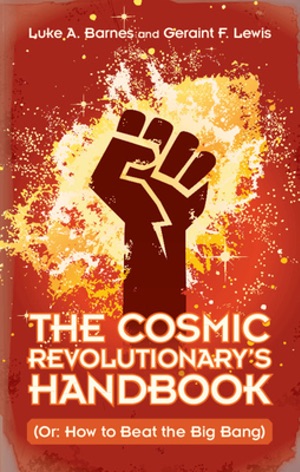Review: The Cosmic Revolutionary’s Handbookby Jeff Foust
|
| The book, though, is really a discussion of why the Big Bang is—for now, at least—the best explanation for the universe’s origin and evolution. |
If you’re going to go after the Big Bang, astrophysicists Luke A. Barnes and Geraint F. Lewis write, you’re going to have to do better than that. The two have received their share of inputs, “in person, in neatly written letters, or via grammar-optional emails,” from people who don’t believe in the Big Bang and instead advocate alternative cosmologies. But don’t worry, they’re here to help.
Their book The Cosmic Revolutionary’s Handbook is written as a guide to those would-be cosmological rebels. The first chapter, in fact, is something of a how-to for those wishing to publish their alternative models, with guidance ranging from learning mathematics to submitting your papers to journals rather than emails to scientists. (The suggestion to use LaTeX, a complex document formatting system for scientific papers, might alone be enough to weed out most of the worst ideas.)
The book, though, is really a discussion of why the Big Bang is—for now, at least—the best explanation for the universe’s origin and evolution. They explain how the Big Bang explains the phenomena of the universe, from the cosmic microwave background to the increase in redshift of objects as a function of distance, better than any other alternative we currently have. Over the course of about 250 pages, they offer a concise primer about cosmology and the Big Bang.
They acknowledge, though, that the Big Bang is not a perfect explanation. There are unsolved issues, ranging from the mysteries of dark matter and dark energy to the preponderance of matter over antimatter, that the Big Bang does not yet fully explain. That could, Barnes and Lewis write, open the door to an alternative model some day, provided it can explain the universe just as well as the Big Bang while addressing those complications.
“Always remember, at its heart, science invites one-upmanship,” they write at the end of the book. “Just pointing out problems and missing pieces of the big bang model is not enough. It has to be a truly scientific model, grounded in the language of mathematics, and open to all to scrutinize.” They’re willing to embrace a new model if it works better than the Big Bang. But, please, just lay off the Comic Sans.
Note: we are temporarily moderating all comments submitted to deal with a surge in spam.
